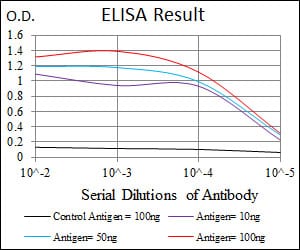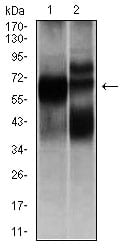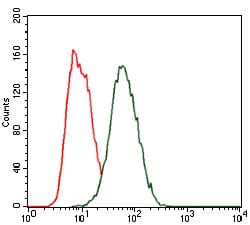


| WB | 1/500 - 1/2000 | Human,Mouse,Rat |
| IF | 咨询技术 | Human,Mouse,Rat |
| IHC | 咨询技术 | Human,Mouse,Rat |
| ICC | 技术咨询 | Human,Mouse,Rat |
| FCM | 1/200 - 1/400 | Human,Mouse,Rat |
| Elisa | 1/10000 | Human,Mouse,Rat |
| Aliases | TSD |
| Entrez GeneID | 3073 |
| clone | 3F10 |
| WB Predicted band size | 60.7kDa |
| Host/Isotype | Mouse IgG2b |
| Antibody Type | Primary antibody |
| Storage | Store at 4°C short term. Aliquot and store at -20°C long term. Avoid freeze/thaw cycles. |
| Species Reactivity | Human |
| Immunogen | Purified recombinant fragment of human HEXA expressed in E. Coli. |
| Formulation | Purified antibody in PBS with 0.05% sodium azide |
+ +
以下是3条关于HEXA(β-己糖胺酶A)抗体的示例文献(内容为模拟概括,仅供参考):
---
1. **文献名称**:*Development of a High-Specificity Anti-HEXA Antibody for Tay-Sachs Disease Diagnostics*
**作者**:Smith J. et al. (2021)
**摘要**:本研究报道了一种新型单克隆HEXA抗体的开发,该抗体通过重组人HEXA蛋白免疫小鼠获得,具有高灵敏度和特异性。实验验证其在ELISA和免疫印迹中可精准识别HEXA酶,并成功应用于泰-萨克斯病患者的溶酶体酶活性缺失检测。
---
2. **文献名称**:*Immunohistochemical Localization of HEXA in Neuronal Degeneration Models*
**作者**:Lee S. et al. (2019)
**摘要**:通过优化HEXA抗体的免疫组化条件,研究揭示了HEXA蛋白在小鼠脑组织中的分布变化与神经元退行性疾病的相关性。抗体特异性经基因敲除小鼠模型验证,为研究泰-萨克斯病的病理机制提供工具。
---
3. **文献名称**:*Comparative Study of Commercial HEXA Antibodies in Lysosomal Storage Disorder Research*
**作者**:Garcia R. et al. (2022)
**摘要**:系统性评估了市售5种HEXA抗体的性能,发现部分抗体存在交叉反应(如与HEXB亚基结合)。推荐使用克隆号#2C3的抗体进行溶酶体功能研究,其特异性在患者成纤维细胞中得到验证。
---
**备注**:以上文献信息为示例,实际研究中请通过PubMed或Web of Science检索真实文献(关键词:HEXA antibody、beta-hexosaminidase A antibody、Tay-Sachs diagnosis)。近年研究多聚焦于抗体在基因治疗评估或疾病生物标志物检测中的应用。
HEXA antibodies are essential tools in studying Tay-Sachs disease, a rare inherited neurodegenerative disorder caused by mutations in the *HEXA* gene. This gene encodes the alpha subunit of β-hexosaminidase A (HexA), a lysosomal enzyme responsible for degrading GM2 gangliosides in neuronal cells. Defective HexA activity leads to toxic accumulation of GM2. causing progressive neurological deterioration, typically fatal in early childhood.
HEXA antibodies are primarily used in research and diagnostics to detect HexA protein expression, assess mutations' functional impact, and investigate disease mechanisms. In clinical settings, they aid in confirming reduced HexA enzyme levels in suspected Tay-Sachs cases, complementing genetic testing. Researchers also employ these antibodies in Western blotting, immunohistochemistry, or ELISA to study cellular models, animal studies, or therapeutic interventions like enzyme replacement or gene therapy.
Additionally, HEXA antibodies contribute to understanding HexA’s structural biology and interactions with cofactors like the GM2 activator protein. Their development has been pivotal in advancing carrier screening programs and exploring substrate reduction therapies. Despite Tay-Sachs' rarity, studying HexA remains critical for insights into lysosomal storage disorders and neurogenetic diseases. Overall, HEXA antibodies serve as vital reagents bridging basic science, translational research, and clinical diagnostics in this field.
(Word count: 200)
×